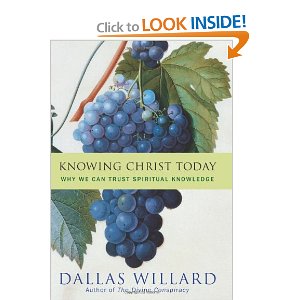Knowing Christ Today, by Dallas Willard
Dallas Willard was the commencement speaker at Westmont College earlier this month and it was good to hear him speak to the graduates. Several people mentioned his new book, Knowing Christ Today, so I decided to give it a try.
The first thing that strikes you about this book is how difficult it is to grasp the concepts Willard explores. This is the kind of book you read and then re-read because you didn’t quite grasp it the first time. Willard even warns about this in his introduction, stating that reading this book will, “…require considerable mental effort to understand.”
As you wade through the complexity of the ideas you are struck by the simplicity of the writing. Willard is not the kind of writer who employs a complex writing style or even a particularly broad vocabulary. It’s not the writing that is complex; it’s the ideas.
But what incredible ideas! The basis of the book is that the faith and knowledge are not at odds. There is no contradiction between the two. One informs the other. Yet after thousands of years of accepting this, we have abandoned that understanding. Willard decries the way the Church has stepped away from the conversation about knowledge.
The cover of the book has a quote from Richard Foster that says it really well, “Dallas Willard focuses like a laser beam on the issue of moral knowledge as a legitimate source for understanding reality and applying it to daily life.” That’s exactly what this book is about.
It’s particularly interesting to me for two reasons. First, I am a member of the Westmont College Board of Trustees. This is an institution that attempts to bring faith and knowledge together. The last chapter of Knowing Christ Today challenges Christian institutions of higher learning. It’s a good reminder that we cannot lose sight of our mission.
The second reason that the book interests me is that I’m President and Co-Founder of PathLight International. The mission of PathLight is to serve at-risk youth by providing educational opportunities that integrate faith and learning. This is a challenge in a developing country. But it is critically important because it develops young men and women who possess cultural, academic, and spiritual knowledge. Such strengths are transformational for individuals and communities. Willard understands that and, I think, would be impressed by what PathLight is doing.
So despite the dense nature of the ideas in this book, it’s an excellent and relevant message. If your interest is in education, spirituality, history, culture, theology, philosophy, science … just about any topic that espouses the pursuit of knowledge, then this book should be on your must read list.

